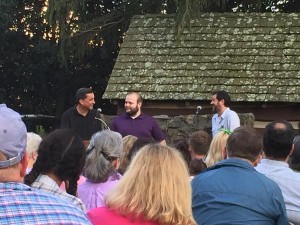“What are we going to call him? … Tiberius? You kidding me? No, that’s the worst.
Let’s name him after your father. Let’s name him Jim.”
— George Kirk
One of the coolest parts about being a fan of something is sharing the love with other people who feel the same way, whether it’s Star Trek, comics, NASCAR, stamp collecting, the lives of the saints or whatever floats your boat. Recently, I was able to attend the Star Trek Live event at Wolf Trap National Park for the Performing Arts just outside of Washington, D.C., with the National Symphony Orchestra playing the soundtrack to the 2009 Star Trek movie live for an audience of thousands.
 Giacchino is to the right, in the blue.
Giacchino is to the right, in the blue.
As an added treat, soundtrack composer Michael Giacchino, introduced the film and attended a Q-and-A session with an audience of over two hundred. Giacchino has been called “the new John Williams,” and it’s very easy to see why.
The composer’s year has been incredibly busy. He has been responsible for four big-screen blockbuster soundtracks just this year alone, and he’s only recently had his first break since. It’s always a lot of fun to hear creators talk about their creative processes, and whether you’re interested in writing, art, or music, I think he had some very important things to say:
“You have to have honesty. Art is about iterations.” — @m_giacchino at @Wolf_Trap — Sacred Earthlings (@earthlingeditor) August 1, 2015
The first time you find out if something in your soundtrack works is when others see it. – @m_giacchino at @Wolf_Trap — Sacred Earthlings (@earthlingeditor) August 1, 2015
“Do not work with mean people. If time were money you would spend it in a much different way then you do now.” – @m_giacchino at @Wolf_Trap — Sacred Earthlings (@earthlingeditor) August 1, 2015
Star Trek’s soundtrack took 7-8 weeks to write. Then editing — going back to reorchestrate to fit final edit. @m_giacchino at @Wolf_Trap — Sacred Earthlings (@earthlingeditor) August 2, 2015
In my favorite part of the talk, Giacchino discussed his thought process behind composing the bombastic, breathless last few minutes of George Kirk’s life. The portion where George Kirk is saying goodbye to his wife and newborn son had been originally presented to executives using fast action music filler. For the official soundtrack, however, Giacchino wanted to take a different tactic. He told the audience about the calming, focusing effect a storyteller’s hushed voice can have on an audience. Lowering his voice, growing quieter, the audience leans in. An audience in that situation, he says, listens more attentively. By lowering the action bombast into a quiet, mournful chorale and getting rid of distracting SFX, Giacchino hoped to highlight the sadness of the moment and the grief of the characters while keeping the audience on their toes. I think it works:
Did you catch that delicious musical moment right after Kirk’s birth? When the shuttles and escape pods from the U.S.S. Kelvin make their way from the battlefield like glittering stars? The music builds into a crescendo, and culminates in the grand, heroic, bombastic Giacchino main theme. It had taken him over twenty tries to develop this theme, he told the audience. Twenty. Was the dedication well worth it? The Wolf Trap audience certainly thought so. We could hardly hear the music over the cheering.
How can you apply Giacchino’s lessons in your own creative endeavors?
—-







